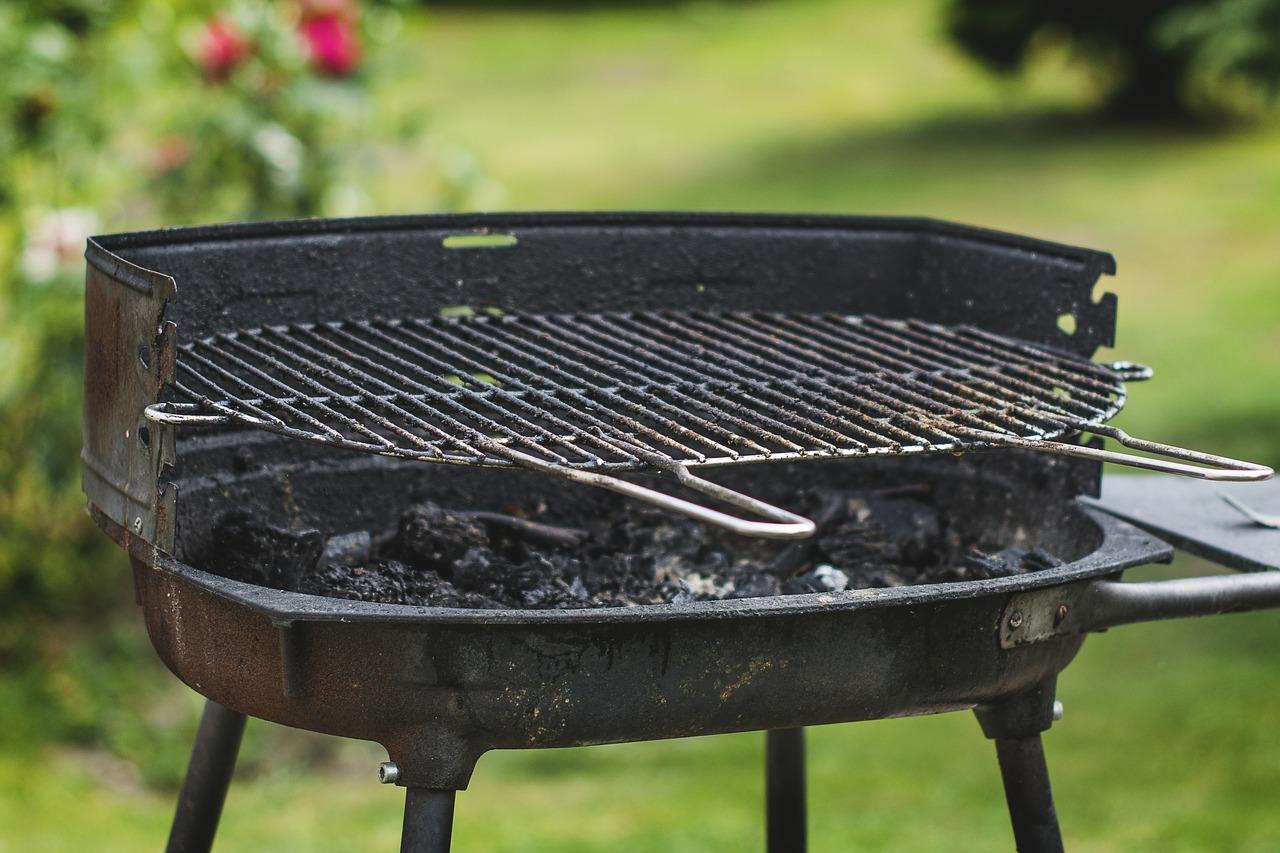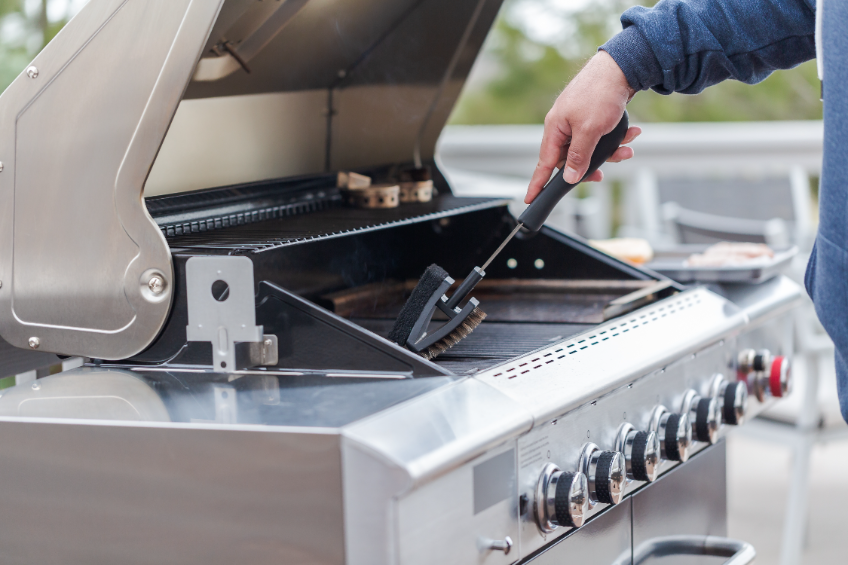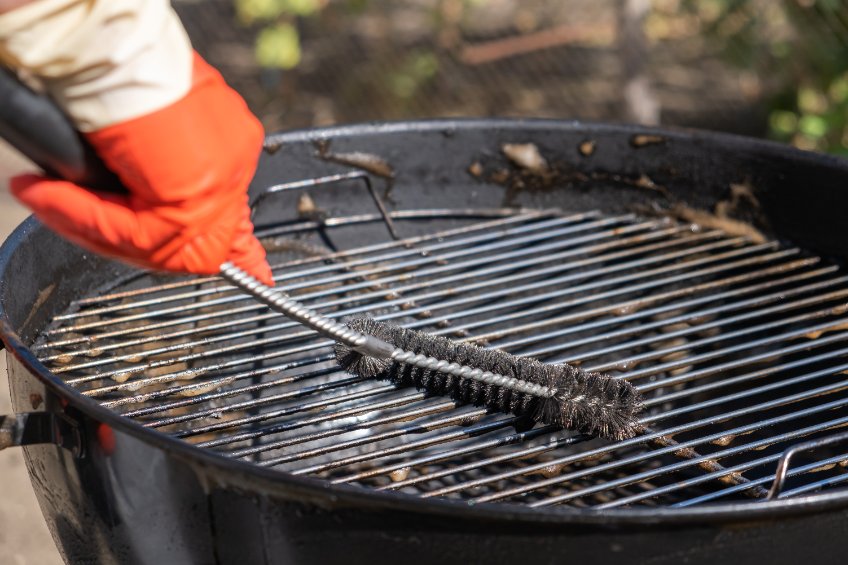
Grill enthusiasts often debate whether rusty grill grates are safe to use, and it’s a valid concern for anyone who loves barbecuing.
Rusty grill grates are not considered safe, as rust can flake off into food, which presents a health risk.
While rust itself isn’t toxic, consuming rust particles can lead to contamination and affect the flavor and enjoyment of your meal.
Maintaining grill grates in a good condition is crucial for both food safety and the longevity of your grill.
Regular cleaning and proper storage can prevent rust from forming.
For those who already have rust on their grates, there are effective methods for removing rust, ensuring that the grilling surface is safe and clean for cooking.
Grilling can bring people together, sparking joy and delicious memories.
Keeping the equipment in top shape is just one part of this experience.
This post will guide readers through methods to prevent and combat rust, preserving both grill functionality and safety.
Understanding Rust on Grill Grates
Rust forms when iron or steel is exposed to moisture and air, resulting in iron oxide.
Grills can develop rust from continued exposure to elements or poor maintenance, impacting performance and safety.
What is Rust?
Rust, or iron oxide, occurs when iron reacts with oxygen in the presence of moisture.
Over time, this reaction forms a reddish-brown layer on metal surfaces.
This substance can appear flaky and fragile, diminishing the integrity of the metal.
Rust affects durability and can spread quickly if not addressed.
It weakens metal by causing structural degradation, reducing its lifespan.
On grill grates, rust can transfer to food, raising concerns about taste and health.
Therefore, understanding the nature of rust is crucial for maintaining grill safety and performance.
Causes of Rust Formation on Grills
Grills are particularly susceptible to rust due to exposure to the elements.
Moisture from rain, humidity, or even frequent washing can contribute significantly.
Salt in the air, especially in coastal regions, accelerates rusting by speeding up the chemical reactions involved.
Additionally, neglecting regular cleaning or failing to apply protective coatings can facilitate rust formation.
Residual food particles or grease left on grates create surfaces where moisture can linger.
Using covers helps protect grills, reducing the risk of rust development by minimizing exposure.
Proper maintenance and preventative measures are essential to minimize rust risks and prolong the lifespan of grill grates.
Health Implications of Cooking on Rusty Grill Grates

Using rusty grill grates may raise concerns about health risks such as iron ingestion or bacteria.
This section explores whether cooking on a rusty grill is safe and any potential health effects.
Is Cooking on a Rusty Grill Safe?
Cooking on rusty grill grates is generally not recommended.
While small amounts of rust may not cause severe harm, consistent use can lead to increased iron exposure.
Ingesting too much iron can pose health challenges.
Routine maintenance can minimize rust formation.
Cleaning the grill regularly and using a grill cover can help prevent rust.
Ensuring grates are in good condition protects against potential health concerns and maintains food quality.
Potential Health Risks
The main concern with rusty grill grates is increased iron ingestion.
Although mild rust exposure is unlikely to be harmful, excessive amounts can lead to issues such as iron poisoning.
Iron overdose can cause nausea, vomiting, or abdominal discomfort.
Tetanus, another concern, is associated with rusty metal, though typically with deep wounds rather than cooking surfaces.
Still, maintaining clean grill surfaces minimizes overall health risks.
Regular inspections and replacements as needed ensure a safer cooking experience.
Materials and Types of Grill Grates
Grill grates come in various materials, each offering unique benefits and characteristics.
Understanding the differences between cast iron and stainless steel grates can help in choosing the right one for grilling needs.
Cast Iron Grill Grates
Cast iron grill grates are renowned for their excellent heat retention.
They heat evenly and can reach high temperatures, making them ideal for achieving a perfect sear on meats.
Maintenance is critical, requiring regular oiling to prevent rust.
Durability is a key feature, but they can be prone to rust if not well-cared-for.
It’s essential to clean them thoroughly after use and store them in a dry place.
Their weight provides stability on a grill, yet this can make handling cumbersome.
Cast iron grates often come with a coating of porcelain or enamel.
This coating helps prevent rust and makes cleaning easier.
Users should be aware that dropping a grate with this coating could result in chipping, exposing the grill to potential rust.
Stainless Steel Grates
Stainless steel grates are known for their resistance to corrosion.
This makes them easier to maintain compared to cast iron options.
They do not require the same level of oiling, reducing maintenance time.
Their smooth surface allows food to release easily, simplifying cleaning.
These grates heat quickly and cool down fast, providing efficient cooking.
This feature is advantageous for those needing agility in temperature control.
While not retaining heat as well as cast iron, they offer a good grilling experience for most foods.
Durability is another highlight, as they are less likely to warp or rust over time.
Their lightweight nature makes them easier to handle and replace.
Regular cleaning with a grill brush keeps them in optimal condition.
Cleaning and Maintenance of Grill Grates

Proper care of grill grates involves rust removal, regular cleaning, and seasoning.
These steps help ensure safe cooking surfaces while prolonging the life of your grill.
Removing Rust from Grill Grates
Rusty grill grates can be unsightly and potentially unsafe.
Rust removal begins with a few effective household solutions.
Mixing vinegar and salt creates an acidic mixture that can help dissolve rust.
Soak the grates overnight and scrub with a wire brush.
Baking soda is another option.
Make a paste with water and apply it to the rusty areas.
Let it sit for a few hours before scrubbing.
A grill brush can also be effective for less severe rust.
Regular inspection can help catch rust early.
Routine Grill Grate Cleaning
Routine maintenance prevents buildup and extends the life of grill grates.
Start by heating the grill to burn off residue, then brush the grates with a grill brush.
For deeper cleaning, remove the grates and wash them with warm soap and water.
Using a brass or stainless-steel brush adds safety, as these are less likely to leave bristles behind.
Allow grates to dry completely to avoid rust.
Using an aluminum foil ball can also be useful for scrubbing stubborn spots.
Seasoning Your Grill Grates
Seasoning creates a non-stick surface and protects against rust.
After cleaning, heat the grates and apply a thin layer of cooking oil using a brush or paper towel.
Let the oil burn off to create a protective layer.
Repeating this process every few cooks maintains the seasoning.
Cast iron grates, in particular, benefit from regular seasoning to prevent rust and maintain food quality.
Opt for oils with a high smoke point like vegetable or canola oil.
Preventing Rust on Grill Grates
Preventing rust on grill grates involves using protective measures and proper storage solutions.
Keeping grates clean and investing in the right covers helps maintain their condition.
Protective Measures for Grill Grates
One effective way to prevent rust is to oil the grates after each use.
Vegetable oil or olive oil forms a protective barrier against moisture, which is critical in rust prevention.
Regular cleaning with a wire brush helps remove food particles and debris, thus reducing the risk of rust.
High-quality grill covers are beneficial.
Waterproof and breathable materials protect against the elements.
Ensuring the cover fits snugly over the grill prevents water from seeping in.
Another protective measure is applying high-temperature grill paint.
It adds an extra layer of protection and extends the life of the grates.
Select a paint specifically designed for grills to withstand the heat.
Proper Grill Storage
Proper storage is essential in preventing rust during the off-season.
Keeping grills in a dry, sheltered area reduces exposure to moisture.
If outdoor storage is necessary, using a heavy-duty cover is crucial.
In cold climates, indoors storage, such as a garage or shed, is recommended.
This minimizes exposure to snow and rain.
For additional safety, investing in a grill cover can provide extra insulation and protection from weather changes.
Regular maintenance checks ensure that protective measures remain effective.
Checking for tears in covers or chips in protective coatings helps maintain the grill’s integrity throughout the year.
Alternative Solutions and Expert Tips

Rusty grill grates can be a concern for many grill enthusiasts.
Below are some practical strategies to address rust issues and guidance on when it’s best to simply replace your grill components.
Professional Advice for Rusty Grills
Experts recommend maintaining clean grill grates to prevent rust.
Regularly applying cooking oil after each use can create a protective barrier.
Using a brush with stainless steel bristles helps remove rust and debris.
Grill specialists suggest storing grills in a covered area to minimize exposure to moisture, which contributes to rust formation.
For persistent rust, some experts advocate professional cleaning services.
These specialists use advanced tools and techniques to refurbish heavily rusted grates effectively.
Natural Methods for Rust Removal
For those preferring natural solutions, lemon juice and salt make a powerful combination for rust removal.
Sprinkling salt on the grate and applying lemon juice can help dissolve rust.
Another effective method involves soaking the grates in a mixture of white vinegar and baking soda.
This method helps lift rust without harsh chemicals.
Scrubbing with a mild detergent afterward ensures all residue is eliminated.
These methods are gentle on the environment and can be repeated as needed.
When to Replace Grill Grates
In some cases, replacing grill grates is inevitable.
When rust penetrates deeply or the metal shows significant damage, safety can be compromised.
Grill grates with deteriorated structural integrity should be replaced.
When food starts sticking persistently or cleaning doesn’t remove discoloration, it’s another sign to purchase new grates.
Investing in high-quality grates can prevent future rust issues.
Cast iron grates coated with porcelain are often recommended for their durability and rust resistance.
The Grilling Experience with Clean Grates
Clean grill grates contribute significantly to improving both the taste and safety of grilled food.
They also ensure that the food maintains its integrity during the cooking process.
Enhancing Taste and Safety
Smooth, clean grill grates play a key role in improving taste.
With no remnants of past grilling sessions, flavors of bbq meats or vegetables remain pure.
Charcoal or electric grills, when used with clean grates, provide a more authentic flavor with no added burnt or metallic taste.
Safety is enhanced as well, as no carbon buildup reduces the risk of flare-ups or hazardous smoke.
Residue-free surfaces also prevent rust and other contaminants from mixing into the food.
Using clean grates consistently ensures an enjoyable and worry-free grilling experience that enhances community gatherings, cookouts, and other social events centered around grilling.
Maintaining the Integrity of Food
Maintaining food integrity during cooking is critical.
On clean grill grates, foods cook more evenly.
The risk of sticking and tearing is minimized, preserving the structure and presentation of the food.
Electric or charcoal grills with clean grates offer stable heat distribution.
This results in a consistent cook throughout, from burgers to fish, retaining moisture and texture.
Professional chefs and home cooks alike daily appreciate the benefits of clear grates.
Proper cleaning can be accomplished using wire brushes or specialty cleaners designed specifically for grills.
Prioritizing this step adds significant quality to any grilling occasion.
The enhanced cooking experience aligns with best practices, ensuring every meal meets the highest standards.
